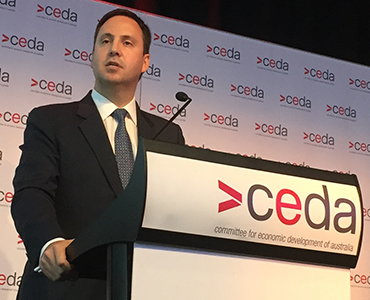The Abbott Government is committed to capitalising on business opportunities in the Indo Pacific region following the signing of free trade agreements with China, Japan and Korea, Parliamentary Secretary for Foreign Affairs, the Hon. Steven Ciobo has told a CEDA audience in Brisbane.

“It’s clear that the two Free Trade Agreements have boosted the standing of Australia, Australian businesses and Australian products and services in market,” he said.
“Our government is doing everything that we can including drawing on our substantial overseas diplomatic network to build growth, trade, investment and drive business.”
On the topic of global capital and investment into Australia, Mr Ciobo said that the Abbott Government is facing opposition from some state governments.
“While the Abbott Government is making Australia a more welcome place for global capital, we do face some headwinds from governments,” he said.
“Unfortunately these governments are here in Australia and include Queensland and of course in particular Victoria.”
Speaking about a recent trip to Japan, Mr Ciobo said investors asked for an explanation of the recent surge in sovereign risk in Australia and the decision of the Victorian Government to rip up the East West Link contract.
“The ripples from these decisions are felt globally, that’s why they’re raised with me and reinforce the need for governments to be so steadfast and focused upon ensuring Australia remains a low sovereign risk profile,” he said.
Mr Ciobo said governments at all levels must have consistent messages internationally.
“While we’re telling the world we’re open for business, we’ve got to make sure that the overwhelming message from all tiers of government is consistent with that,” he said.
The Queensland and Victorian Governments must recognise they are doing damage to Australia’s international standing and reputation, he said.
“The anti-investment attitude from certain parts of Australia must stop,” he said.
Mr Ciobo said the Government’s agenda is about creating economic growth domestically and abroad by more investment, trade and greater engagement in the region.
“Our domestic policy agenda is firmly focused on supporting an export orientated economy,” he said.
“On the back of the China, Japan, Korea Free Trade Agreements, we now remain very focused on the Trans-Pacific Partnership and the Regional Comprehensive (Economic) Partnership,” he said.
“Two very significant negotiations with massive implications for lowering business costs and easing trade throughout our region.”